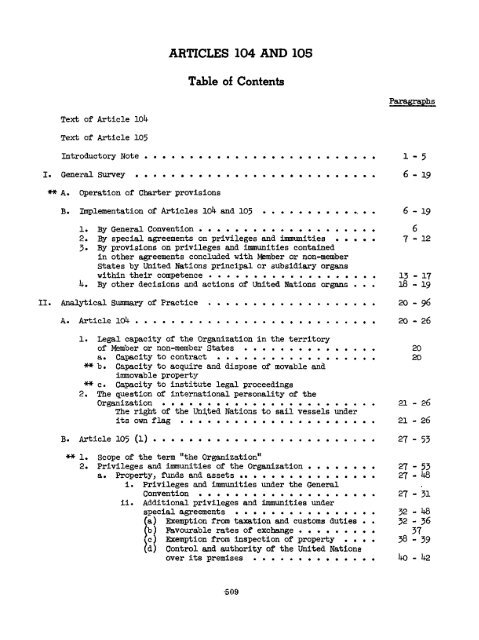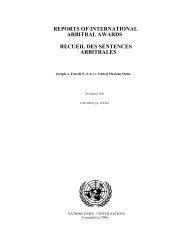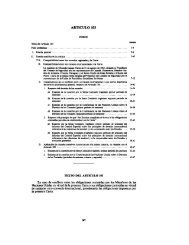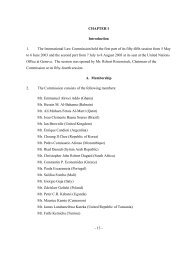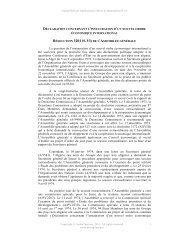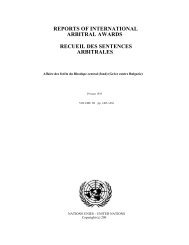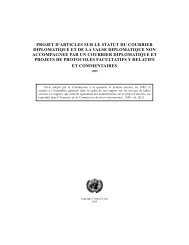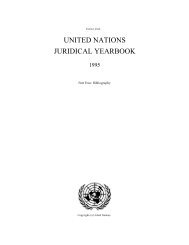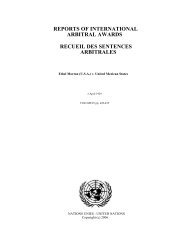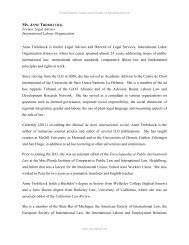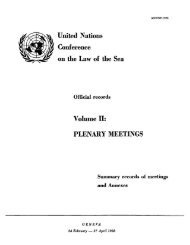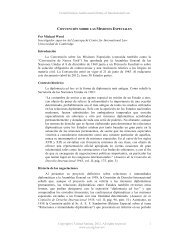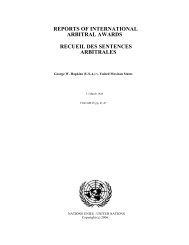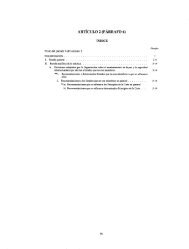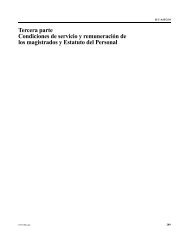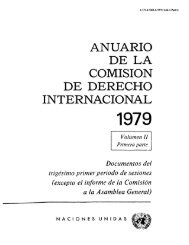Arts. 104-105, Repertory, Suppl. 2, Vol. III (1955-1959)
Arts. 104-105, Repertory, Suppl. 2, Vol. III (1955-1959)
Arts. 104-105, Repertory, Suppl. 2, Vol. III (1955-1959)
Create successful ePaper yourself
Turn your PDF publications into a flip-book with our unique Google optimized e-Paper software.
Text of Article 10^<br />
Text of Article <strong>105</strong><br />
ARTICLES <strong>104</strong> AND <strong>105</strong><br />
Table of Contents<br />
Paragraphs<br />
Introductory Note ...... •• ..... ............. 1-5<br />
I. General Survey ........................... 6-19<br />
** A. Operation of Charter provisions<br />
B. Implementation of Articles 10^ and <strong>105</strong> ........... • • 6-19<br />
1. By General Convention ..... .......... ..... 6<br />
2. By special agreements on privileges and immunities ..... 7-12<br />
3» By provisions on privileges and immunities contained<br />
in other agreements concluded with Member or non-member<br />
States by United Nations principal or subsidiary organs<br />
within their competence ................... 13-17<br />
k. By other decisions and actions of United Nations organs ... 18-19<br />
II. Analytical Summary of Practice ... ................ 20-96<br />
A. Article 1
Articles 1C4 and <strong>105</strong><br />
Table of Contents<br />
(continued)<br />
Paragraphs<br />
(e) Police protection of United Nations<br />
premises ....... ^3 - W±<br />
(f) Right of transit and freedom of access to<br />
the United Nations Headquarters district or<br />
conference area ..»... ^.5 - J-t-8<br />
ID» Facilities in respect of communications ......... *J-9 - 53<br />
C. Article <strong>105</strong> (2) 5^-96<br />
1. Privileges and immunities of representatives of Members ... 5^-<br />
2. Privileges and immunities of officials of the Organization . 55-72<br />
a. Categories of officials ... o .....*., 55<br />
b« Privileges and immunities . . . » 56-71<br />
i. General provisions
** D. Article <strong>105</strong> (3)<br />
Articles 10U and <strong>105</strong> Paragraphs 1-2<br />
Table of Contents<br />
(continued)<br />
Annex. Member States which acceded to the Convention on the Privileges and<br />
Immunities of the United Nations between 1 September 1956 and<br />
31 August <strong>1959</strong><br />
TEXT OF ARTICLE <strong>104</strong><br />
The Organization shall enjoy in the territory of each of its Members such<br />
legal capacity as may be necessary for the exercise of its functions and the<br />
fulfillment of its purposes.<br />
TEXT OF ARTICLE <strong>105</strong><br />
1. The Organization shall enjoy in the territory of each of its Members<br />
such privileges and immunities as are necessary for the fulfillment of its<br />
purposes.<br />
2. Representatives of the Members of the United Nations and officials<br />
of the Organization shall similarly enjoy such privileges and immunities as<br />
are necessary for the independent exercise of their functions in connection<br />
with the Organization.<br />
3. The General Assembly may make recommendations with a view to<br />
determining the details of the application of paragraphs 1 and 2 of this Article<br />
or may propose conventions to the Members of the United Nations for this<br />
purpose.<br />
INTRODUCTORY NOTE<br />
1. The general structure of the present study follows that of Articles 10^ and <strong>105</strong> * n<br />
the previous <strong>Repertory</strong> studies, except for the omission of a few subheadings and the<br />
addition of two new subheadings. The former subheadings under section II C 2 a have<br />
been deleted because of the lack of new material. The new subheadings added under<br />
section II C are 5» "Privileges and immunities of the members of the United Nations<br />
Emergency Force" and 6. "Privileges and immunities of operational and executive<br />
personnel".<br />
2. Though the United Nations Emergency Force (UNEF) was created as a subsidiary organ<br />
of the General Assembly and, as such, its status, privileges and immunities are<br />
treated under the appropriate original headings, the members of UNEF recruited from<br />
among the military forces of Member States were not "officials of the United Nations"<br />
within the meaning of the Convention on the Privileges and Immunities of the United<br />
Nations, I/ referred to hereinafter as the "General Convention". These members of UNEF<br />
formed a special category of international personnel and enjoyed such privileges and<br />
I/ United Nations, Treaty Series, vol. 1, I, No. U, p. 15<br />
511
Paragraphs 3-6 Articles 1C4 and <strong>105</strong><br />
immunities as were granted to them under the special agreements between the United<br />
Nations and the host countries, in accordance with the Regulations 2/ issued by the<br />
Secretary-General, vhich took into account their international status as well as their<br />
national character.<br />
3» The personnel provided by the United Nations to requesting Governments under the<br />
programme for the provision of operational, executive and administrative personnel<br />
(OPEX), as a form of technical assistance in public administration under General<br />
Assembly resolution 1256 (X<strong>III</strong>), were assigned duties by the Governments concerned and<br />
•were responsible only to them. They were neither "officials of the United Nations"<br />
nor "experts on missions for the United Nations". They had a special international<br />
status, however; they entered into special contracts with the United Nations which<br />
defined their relationship to the Organization, and their privileges and immunities<br />
were provided for in agreements concluded between the United Nations and the<br />
Governments concerned.<br />
k. For the reasons mentioned in the two preceding paragraphs, the privileges and<br />
immunities of the military personnel of UNEF and those of OPEX are treated in separate<br />
sections in the present study, in relation to Article <strong>105</strong>t paragraph 2, under items<br />
II C 5 and II C 6.<br />
5. The question of the right of the United Nations or any other international<br />
organization to sail vessels under its own flag (see section II A 2 of the present<br />
study) ; as discussed at the seventh and eighth sessions of the International Law<br />
Commission in connexion with the articles on the régime of the high seas, was reported<br />
in detail in the <strong>Repertory</strong>, <strong>Suppl</strong>ement No* 1. 3/ The United Nations Conference on the<br />
Law of the Sea, which was convened in February 1958* took the articles prepared by the<br />
Commission as a basis for its discussion. Although the Conference was not an organ of<br />
the United Nations, its decision relating to the question of the United Nations flag,<br />
in the form of an additional article incorporated in the Convention on the High Seas, k<br />
is treated in the present study in order to show the subsequent development of a<br />
question which had previously been examined by a subsidiary organ of the United<br />
Nations.<br />
I. GENERAL SURVEY<br />
**A. Operation of Charter provisions<br />
B. Implementation of Articles <strong>104</strong> and <strong>105</strong><br />
1. By General Convention<br />
6. Twelve Member States acceded to the Convention on the Privileges and Bnmunities<br />
of the United Nations (General Convention) during the period from 1 September 1956 "to<br />
1 September <strong>1959</strong>» The accessions of two Members contained reservations regarding<br />
certain provisions of the General Convention (see the annex to the present study). The<br />
total number of accessions had reached sixty-one on 1 September <strong>1959</strong>»<br />
2/ Regulations for the United Nations Emergency Force (ST/SGB/UNEF/1,<br />
20 February 195?)•<br />
3/ <strong>Vol</strong>. II, under Articles 10^ and <strong>105</strong>, paras. 13-23•<br />
S/ United Nations Conference on the Law of the Sea, Plen., A/CONF.13/38 (United<br />
Nations Publication, Sales No.: 5$»VA), vol. II, p. 135, A/CONF. 13/L.53»<br />
512
Articles <strong>104</strong> and <strong>105</strong> Paragraphs 7-12<br />
2. By special agreements on privileges and immunities<br />
?• By an exchange of letters on 8 February 1957 5/ between the Secretary-General,<br />
acting in consultation with the Advisory Committee established under General Assembly<br />
resolution 1001 (Kj-l) and the Minister for Foreign Affairs of Egypt, an agreement was<br />
reached concerning the status of the United Nations Emergency Force (UNKF) in Egypt,<br />
hereafter referred to as the "status Agreement with Egypt". This agreement provided,<br />
among other things, that the status, privileges and immunities of the United Nations<br />
were to be extended to IMEF in accordance with the General Convention.<br />
8. In an exchange of letters between the Commander of UNEF and the Minister for<br />
Foreign Affairs of Lebanon, a provisional agreement concerning a UNEF leave centre<br />
in Lebanon, 6/ hereafter referred to as the "Leave Centre Agreement with Lebanon", was<br />
concluded on 29 April 1957» This agreement was similar in its provisions to the<br />
Status Agreement with Egypt, and it applied the privileges and immunities of the<br />
General Convention to UNEF in Lebanon.<br />
9» The Secretary-General and the Government of Thailand concluded an agreement<br />
concerning the privileges and immunities of the Economic Commission for Asia and the<br />
Far East (ECAFE) in Thailand; J/ this was complementary to the General Convention.<br />
This agreement was ratified by Thailand on 6 February 1957»<br />
10. The status, privileges and immunities of the United Nations Observation Group in<br />
Lebanon (UNOGIL) were agreed upon in an exchange of letters between the Secretary-<br />
General and the Foreign Minister of Lebanon, dated 13 June 195^, and an amendment dated<br />
26 and 30 June 1958» 8/ This agreement was to take effect upon the arrival in Lebanon<br />
of UNOGIL.<br />
11. An exchange of letters between the Secretary-General and the Government of<br />
Jordan 9/ in November 1958 provided for privileges, immunities and facilities for the<br />
subsidiary organ of the United Nations under the charge of the Special Representative<br />
of the Secretary-General stationed in Jordan in furtherance of General Assembly<br />
resolution 1237 (ES-IIl), as well as for the Special Representative and the officials<br />
of the United Nations assigned to his staff.<br />
12. In connexion with the convening of the twenty-seventh session of the Economic and<br />
Social Council in Mexico City, an exchange of letters between the Secretary-General<br />
and the Government of Mexico JO/ in April <strong>1959</strong> provided for the application, for the<br />
purpose of the session, of the General Convention to the United Nations, its staff,<br />
2/ "Exchange of letters constituting an agreement between the United Nations and the<br />
Government of Egypt concerning the status of the United Nations Emergency Force<br />
in Egypt, with a summary of the arrangements" (G A (XI), Annexes, vol. II, a.i. 66,<br />
p. 52, A/35 2 6). A report submitted by the Secretary-General concerning this<br />
agreement was noted with approval by the General Assembly in its resolution<br />
1126 (XI).<br />
6/ "Exchange of letters constituting a provisional arrangement concerning the United<br />
Nations Emergency Force Leave Centre in Lebanon. Beirut, 20 and 29 April and<br />
1 May 1957" (United Nations, Treaty Series, vol. 266, I, No. 3827, p. 125).<br />
7/ United Nations, Treaty Series, vol. 260, I, No. 3703, ?• 35»<br />
H/ Ibid., vol. 303, I» No. 4386, p. 271; also reproduced, without the amendment<br />
of 26 and 30 June 1958, in S C, 13th yr., <strong>Suppl</strong>. for Apr.-June, p. 70, A/4029,<br />
annex II.<br />
9/ Ibid., vol. 315, It No. 4564, p. 125.<br />
10/ Ibid., vol. 381, I, No. 5^68, p. 123»<br />
513
Paragraphs 13-17 Articles 10^- and <strong>105</strong><br />
representatives of Members and experts on mission, on the understanding that this -would<br />
not constitute a precedent with respect to the position which the Government of Mexico<br />
might in the future decide to take with respect to the General Convention, to which<br />
Mexico had not acceded.<br />
3. By provisions on privileges and immunities contained in other agreements<br />
concluded with Member or non-member States by United Nations principal<br />
or subsidiary organs within their competence<br />
13. In November 1956, during the first days of resumed operation in the Gaza Strip by<br />
the United Nations Relief and Works Agency for Palestine Refugees in the Near East<br />
(UNRWA), a provisional agreement setting forth the framework within which UNRWA would<br />
continue its operations was reached between UNRWA and Israel authorities. This<br />
agreement took the form of an exchange of letters between the Director of UNRWA and<br />
the Israel Chief of Staff; ll/ it provided that the General Convention would govern<br />
the relations between UNRWA and the Government of Israel.<br />
lij-. In accordance with the authority granted 12/ by the General Assembly on<br />
2 November 1956, the Secretary-General, through an exchange of letters on 8 January<br />
1957 with the Foreign Minister of Egypt, negotiated an agreement for the clearance of<br />
the Suez Canal* 13/ This agreement included a provision to apply the terms of the<br />
General Convention to the property and personnel of the United Nations and to<br />
contractors (including subcontractors) working under United Nations direction.<br />
15. An exchange of letters dated 21 December 1957 and 20 January 1958 between the<br />
Commander of UNEF and the Foreign Minister of Lebanon brought about an agreement<br />
concerning a UNEF transit unit at the Beirut international airfield and an agreement<br />
concerning postal arrangements for UNEF. Ik/ The former agreement made the Leave<br />
Centre Agreement with Lebanon applicable mutatis mutandis to the operation of the<br />
transit unit.<br />
16. In pursuance of General Assembly resolution 1256 (X<strong>III</strong>), "United Nations technical<br />
assistance in public administration", agreements for the provision of operational and<br />
executive personnel were concluded between the United Nations and the Governments<br />
requesting such assistance. Each of the agreements included a provision on the<br />
privileges and immunities which the contracting Government was to grant to such<br />
personnel.» 15 /<br />
17. Each of the agreements concluded between the United Nations Special Fund and the<br />
Governments requesting assistance from the Special Fund l6/ contained a clause on<br />
"facilities, privileges and immunities" to be granted by the Government concerned to<br />
the United Nations and to its organs and its officials; to each specialized agency and<br />
the International Atomic Energy Agency, acting as an executing agency, and its<br />
officials; and, subject to agreement between the parties, to a firm or organization and<br />
its personnel retained to execute or assist in the execution of a development project.<br />
Il/ G A (XI), <strong>Suppl</strong>. No. 1^ A (A/3212/Add.l), para. 18.<br />
12/ G A resolution 997 (ES-l).<br />
13/ G A (XI), Annexes, vol. II, a.i. 66, p. 38, A/3^92, annex II.<br />
ffi/ United Nations, Treaty Series, vol. 286, I, No. kl66, p. 190 and No. ^167, p. 199,<br />
respectively.<br />
15/ See, for example, United Nations, Treaty Series, vol. 319, I, No. ^629, p. 3<br />
(agreement between the United Nations and Burma).<br />
l6/ For example, United Nations, Treaty Series, vol. 338, I, No» W336, p. 203<br />
(agreement between the United Nations and Ghana).<br />
514
Articles 10^ and <strong>105</strong> Paragraphs 18-21<br />
4. By other decisions and actions of United Nations organs<br />
18. The General Assembly adopted a resolution 1_7/ on 27 February 1957 entitled<br />
"Establishment of a Tax Equalization Fund: local and state income taxes". This<br />
resolution concerned the question of immunity from taxation by State and local<br />
governments of salaries and emoluments paid by the United Nations to its staff members<br />
(see paragraphs 57 to 62 below).<br />
19» Acting under the authority conferred on him by General Assembly resolution 1001<br />
(ES-l), the Secretary-General issued Regulations for the United Nations Emergency<br />
Force l8/ affirming the international character of UNEF as a subsidiary organ of the<br />
General Assembly and defining its rights and duties.<br />
H. ANALYTICAL SUMMARY OF PRACTICE<br />
A. Article <strong>104</strong><br />
1. Legal capacity of the Organization in the territory<br />
of Member or non-member States<br />
a. CAPACITY TO CONTRACT<br />
20o The capacity of United Nations organs to enter into contracts was recognized in<br />
the General Convention 19/ and in various agreements between the United Nations and<br />
individual States. During the period under review, this legal capacity was given<br />
express recognition in the Regulations for the United Nations Emergency Force<br />
(UNEF) 20/ and in the agreement with Thailand concerning the headquarters of the<br />
Economic Commission for Asia and the Far East (ECAFE). 21/<br />
**b. CAPACITY TO ACQUIRE AND DISPOSE OF MOVABLE AND<br />
IMMOVABLE PROPERTY<br />
**C. CAPACITY TO INSTITUTE LEGAL PROCEEDINGS 22/<br />
2. The question of international personality of the Organization<br />
The right of the United Nations to sail vessels under its<br />
own flag<br />
21» The question of the right of the United Nations to sail vessels under its own<br />
flag was considered by the International Law Commission in connexion with the<br />
IT/ G A resolution 1099 (Xl), amending resolution 937 (x), para. *u<br />
IB/ ST/SGB/UNEF/1.<br />
19/ United Nations, Treaty Series, volo 1, I, No. b.<br />
20/ Paragraph 27 of the Regulations provided that "The Commander shall enter into<br />
contracts and make commitments for the purpose of carrying out his functions<br />
under these Regulations" (ST/SGB/UNEF/1, para. 27).<br />
21/ United Nations, Treaty Series, vol. 260, I, No. 3703, p. 35, article II,<br />
section 2.<br />
22/ For the institution by the United Nations Relief and Works Agency for Palestine<br />
Refugees in the Near East (UNRWA) of legal proceedings before local courts, see<br />
G A (XI), <strong>Suppl</strong>. No. 1^ (A/3212), annex G; G A (XII), <strong>Suppl</strong>. No. 1^ (A/3686),<br />
annex H«<br />
515
Paragraph 22-25 Articles 1C4 and <strong>105</strong><br />
Commission^ draft articles -on the régime of the high seas. The conclusion reached<br />
by the Commission on this question and the relevant discussions were examined in an<br />
earlier <strong>Repertory</strong> study of these Articles. 23/<br />
22. In accordance -with General Assembly resolution 1<strong>105</strong> (XI), the United Nations<br />
Conference on the Law of the Sea was convened by the United Nations in Geneva on<br />
2^ February 1950» As a basis for its discussion, the Conference utilized the articles<br />
concerning the law of the sea prepared by the International Law Commission, 2kJ and<br />
allocated the articles relating to the régime of the high seas to the Second Committee<br />
of the Conference.<br />
23. A memorandum 25/ on the "use of the United Nations flag on vessels" was prepared by<br />
the United Nations Secretariat for the information of the Second Committee of the<br />
United Nations Conference on the Law of the Sea in connexion with its consideration of<br />
the question of the nationality of ships. The memorandum stated that the United<br />
Nations flag had been flown on (a) the fishing vessels of the United Nations Korean<br />
Reconstruction Agency (UNKRA), 26/ (b) the vessels of the United Nations Emergency<br />
Force (UNEF) and (c) the vessels of the United Nations Suez Canal Clearance Operation<br />
(UNSCO). The United Nations flag had been used on both registered and unregistered<br />
ships on the high seas and on the territorial sea. In the case of registered vessels,<br />
the United Nations flag had been flown either with or without the national flags of the<br />
vessels. It was pointed out that in all instances the use of the United Nations flag<br />
had been based on urgent and practical considerations; it had served the purpose of<br />
identifying the vessels as part of a United Nations undertaking and of indicating that<br />
they would be entitled to the protection of the United Nations.<br />
2k. In the discussion of the International Law Commission, the argument against the<br />
right of the United Nations to register its ships and fly its flag was based mainly on<br />
the question of jurisdiction over crimes committed on such ships on high seas. 27/<br />
The Secretariat memorandum referred to above 28/ reported a case in which UNEF took<br />
title to a landing craft mechanized (LCM) without placing it on any national registry.<br />
It was explained that this case was not expected to present any major problem as<br />
regards criminal jurisdiction since the crew would be composed entirely of members of<br />
UNEF, who were subject to the criminal jurisdiction of their own national States (see<br />
paragraphs 81-83 below). Nor would any question arise relating to jurisdiction over<br />
goods carried on board the craft, since in all cases the goods would be the property of<br />
either UNEF or, on occasion, the United Nations Relief and Works Agency for Palestine<br />
Refugees in the Near East; (UNRWA).<br />
25. During the meetings of the Second Committee of the United Nations Conference on<br />
the Law of the Sea, a proposal 29/ was submitted to add, after the articles on the<br />
nationality and status of ships, a new article reading as follows:<br />
23/ <strong>Suppl</strong>ement No. 1, vol. II, under Articles 10^ and <strong>105</strong>, paras. 13-23•<br />
jS/ G A (XI), <strong>Suppl</strong>. No. 9 (A/3159), PP. Mtfgj>/<br />
United Nations Conference on the Law of the Sea, A/CONF.13A 0 (United Nations<br />
Publication, Sales No.: 58.VA, vol. 17), p. 138, A/CONF.13/C.2/L.87-<br />
$6/ This instance is reported in the <strong>Repertory</strong>, <strong>Suppl</strong>ement No. 1, vol. II, under<br />
Articles 1(& and <strong>105</strong>, para. Ik.<br />
2j/ Yearbook of the International Law Commission, <strong>1955</strong> (A/CN.VsER.A/<strong>1955</strong>; United<br />
Nations Publication, Sales No.: 60.V.3, vol. IJ, 320th mtg., paras. 69 and 78.<br />
28/ United Nations Conference on the Law of the Sea, A/CONF.13ÂO (United Nations<br />
Publication, Sales No.: 58.7.^, vol. 17), p. 138, A/CONF.13/C.2/L.87, paras. 8-10,<br />
29/ United Nations Conference on the Law of the Sea, A/CONF.13AO (United Nations<br />
Publication, Sales No.: 58.7.^, vol. B r ), P« 129, A/CONF.13/C.2/L.51.<br />
516
Articles I0k and <strong>105</strong> Paragraph 26<br />
"The provisions of the preceding articles do not prejudice the question of ships<br />
employed on the official service of an inter-governmental organization flying the<br />
flag of the organization".<br />
Upon the recommendation of the Second Committee, the proposed article was adopted<br />
by the Conference and was incorporated in the Convention on the High Seas as<br />
article 7. 30/<br />
26. Provisions concerning the use of the United Nations flag were also contained in<br />
the following agreements concluded "by the United Nations :<br />
(a) Paragraph 20 of the Status Agreement with Egypt 31/ provided:<br />
"The Egyptian Government recognizes the right of the Force to display within<br />
Egyptian territory the United Nations flag on its headquarters, camps, posts or<br />
other premises, vehicles, vessels and otherwise as decided by the Commander.<br />
Other flags or pennants may be displayed only in exceptional cases and in<br />
accordance with conditions prescribed by the Commander. Sympathetic consideration<br />
will be given to observations or requests of the Egyptian authorities concerning<br />
this last-mentioned matter."<br />
(b) The agreement with Egypt regarding the clearance of the Suez Canal 32/<br />
stated :<br />
"The undertaking would be regarded as a United Nations enterprise and its<br />
personnel would be under obligation to discharge their functions aud regulate their<br />
conduct solely in the interest of the United Nations. In keeping with the United<br />
Nations responsibilities, the vessels would fly the flag of the United Nations in<br />
place of their national flags ...".<br />
(c) Article 15•! of the contract with the consortium of Smit-Svitzer, relating<br />
to the clearance of the Suez Canal 33/ read:<br />
"Srait-Svitzer shall ensure that each of its vessels utilized in the performance<br />
of the work shall fly the UN flag in place of its national flag while in the Suez<br />
Canal area, in accordance with the provisions of the United Nations Flag Code and<br />
any regulations made pursuant thereto by the Secretary-General or his duly<br />
authorized representative. The use of the UN flag on the vessels concerned shall<br />
not be deemed to effect any alteration in their national registration".<br />
30/ Ibid., A/CONF.13/38 (United Nations Publication, Sales No.: 58.V.1*, vol. II),<br />
p. 1J5, A/CONF.13/L.53»<br />
3l/ G A (XI), Annexes, vol. II, a.i. 66, p. 52, A/3526. See also Regulations for<br />
UNEF (ST/SGB/UNEF/1), para. 7-<br />
32/ Ibid,, p. 38, A/3492, annex II.<br />
33/ United Nations Conference on the Law of the Sea, A/CONF.13AO (United Nations<br />
Publication, Sales No.: 58,V.i|-, vol. IV), p. 138, A/CONF.13/C.2/L.87, para. 12.<br />
517
Paragraphs 27-28 Articles Wk and <strong>105</strong><br />
B. Article <strong>105</strong> (1)<br />
**1. Scope of the term "the Organization"<br />
2. Privileges and immunities of the Organization<br />
a. PROPERTY, FUNDS AND ASSETS<br />
i. Privileges and immunities under the General Convention<br />
27. The annual reports 5jj/ submitted by the Director of the United Nations Relief and<br />
Works Agency for Palestine Refugees in the Near East (UNRWA) to the General Assembly<br />
stated that in several of the countries in which UNRWA operated, incidents had occurred<br />
which were prejudicial to the security of the staff and property of UNRWA. The reports<br />
referred to the General Convention, which provided immunity from legal process of "the<br />
property and assets of the United Nations, wherever located and by whomsoever held",<br />
and noted that the provision had not been observed by local courts in some cases arising<br />
from the activities of UNRWA. Legal proceedings brought' before local tribunals which<br />
indicated misunderstanding of the status of UNRWA included a failure to recognize<br />
UNRWA as a subsidiary organ of the United Nations, 3£/ a finding that UNRWA was a<br />
public body of Syria 36/ and a holding that the jurisdictional immunity of UNRWA applied<br />
only to criminal and not to civil cases. 37/ Another instance in which the provision<br />
of the General Convention had not been regarded was the serving of attachment and<br />
garnishee orders on the funds of UNRWA in respect of salaries payable to staff<br />
members. 38 / In all these situations UNRWA had brought to the attention of the<br />
authorities of the host countries its position as an organ of the United Nations and its<br />
right to immunity from every form of legal process.<br />
28. The entire problem concerning the privileges and immunities of UNRWA in relation<br />
with its host Governments was brought before the Special Political Committee during the<br />
eleventh session of the General Assembly. At the twenty-third meeting of the Committee,<br />
the Director of UNRWA drew attention, 39/ among other things, to incidents in Syria and<br />
Gaza in disregard of the international status of UNRWA and its staff. A draft<br />
resolution kO/ was submitted which provided that the General Assembly would request<br />
host Governments to co-operate fully with UNRWA and its personnel in the light of its<br />
international status and privileges and immunities. This provision, as revised and<br />
ultimately adopted by the General Assembly in resolution 1018 (XI), noted the<br />
willingness of the host countries to co-operate with UNRWA and their desire "to extend<br />
to it every appropriate assistance in carrying out its functions, in accordance with<br />
the provisions of Articles 10*4- and <strong>105</strong> of the Charter of the United Nations, the terms<br />
of the Convention on the Privileges and Immunities of the United Nations, the contents<br />
G A (XI), <strong>Suppl</strong>. No. Ik (A/3212), annex G; G A (Hi), <strong>Suppl</strong>. No. Ik (A/3686),<br />
annex H; G A (X<strong>III</strong>), <strong>Suppl</strong>. No. Ik (A/3951 )> annex H.<br />
35/ G A (XII), <strong>Suppl</strong>. No. Ik (A/3686), annex H, para. 1^.<br />
367 Ibid., para. 23.<br />
37/ G A (XI), <strong>Suppl</strong>. No. Ik (A/3212), annex G, para. 2k.<br />
3Ê/ Ibid., para. 10.<br />
39/ G A (XI), Annexes, vol. I, a.i. 23, p. 8, A/SPC/9, paras. 27 and 28.<br />
JijO/ Ibid., p. Ill-, A/SPC/L.13/Rev.l.<br />
518
Articles 10^ and <strong>105</strong> Paragraphs 29-31<br />
of paragraph 17 of resolution 302 (IV) and the terms of the agreements with the host<br />
Governments".<br />
29- The agreement "between the Government of Israel and the Director of UNRWA (see<br />
paragraph 13 above), relating to the operations of UNRWA in the Gaza Strip, provided,<br />
in addition to the terms of the General Convention, that the Government of Israel would<br />
ensure the protection of the personnel, installations and uroperty of UNRWA to the<br />
best of its ability.<br />
30 • Both the Regulations for the United Nations Emergency Force (UNEF) U2/ and the<br />
Status Agreement with Egypt îj$J provided that UNEF, as a subsidiary organ of the<br />
United Nations, should enjoy the status, privileges and immunities of the United<br />
Nations in accordance with the General Convention. The two instruments further<br />
specified that the provisions of article II of the General Convention should also<br />
apply to the property, funds and assets of participating States used in a host State<br />
in connexion with the national contingents serving in UNEF.<br />
31 • Under the agreements between the United Nations Special Fund and the Governments<br />
requesting assistance from the Special Fund, the Governments undertook to apply the<br />
provisions of the General Convention to the United Nations and its property, funds<br />
and assets. The model text of this provision on facilities, privileges and immunities<br />
read as follows:<br />
"1. The Government shall apply to the United Nations and its organs, including<br />
the Special Fund, its property, funds and assets, and to its officials, the<br />
provisions of the Convention on the Privileges and Immunities of the United<br />
Nations .<br />
"2 a The Government shall apply to each Specialized Agency acting as an Executing<br />
Agency, its property, funds and assets and to its officials, the provisions of the<br />
Convention on the Privileges and Immunities of the Specialized Agencies including<br />
any Annex to the Convention applicable to such Specialized Agency. In case the<br />
International Atomic Energy Agency acts as an Executing Agency, the Government<br />
shall apply to its property, funds and assets and to its officials, the Agreement<br />
on the Privileges and Immunities of the International Atomic Energy Agency or, in<br />
the absence of such Agreement, the Convention on the Privileges and Immunities of<br />
the United Nations. (Provisional text, subject to revision after consultation with<br />
International Atomic Energy Agency.)<br />
"3. In appropriate cases where required by the nature of the project, the<br />
Government and the Special Fund may agree that immunities similar to those<br />
in/ In G A resolution 302 (IV), para. 17> the General Assembly "calls upon the<br />
Governments concerned to accord to the United Nations Relief and Works Agency for<br />
Palestine Refugees in the Near East the privileges, immunities, exemptions and<br />
facilities which have been granted to the United Nations Relief for Palestine<br />
Refugees, together with all other privileges, immunities, exemptions and<br />
facilities necessary for the fulfilment of its functions".<br />
k2/ ST/SGB/UNEF/1, para. 10.<br />
Jj3/ G A (XI), Annexes, vol. ! II, a.i. 66, p. 52, A/3526, para. 23.<br />
TP+/ Ibid»; the participating States might not, however, acquire immovable property<br />
in Egypt without agreement with the Government of Egypt.<br />
ij-2/ United Nations Treaty Series, vol. 338, I, No. ^36, p. 203, article V<strong>III</strong>.<br />
519
Paragraphs 32-56 Articles 10*4- and <strong>105</strong><br />
specified in the Convention on the Privileges and Immunities of the United Nations<br />
and the Convention on the Privileges and Immunities of the Specialized Agencies<br />
shall "be granted by the Government to a firm or organization, and to the personnel<br />
of any firm or organization, which may "be retained by either the Special Fund or<br />
an Executing Agency to execute or to assist in the execution of a project. Such<br />
immunities shall "be specified in the Plan of Operation relating to the project<br />
concerned."<br />
ii. Additional privileges and immunities under special agreements<br />
(a) Exemption from taxation and customs duties<br />
32. Under the Status Agreement with Egypt, M5/ UNEF might import duty-free equipment<br />
for UNEF, and provisions, supplies and other goods for the exclusive use of members of<br />
UNEF and members of the United Nations Secretariat detailed by the Secretary-General to<br />
serve with UNEF, except for locally recruited personnel. The agreement also provided<br />
that service institutes might be established at headquarters, camps and posts for the<br />
sale of consumable goods and other articles of nominal value»<br />
33. In addition, UNEF had the right "... to the use of roads, bridges, canals and<br />
other waters, port facilities and airfields without the payment of dues, tolls or<br />
charges either by way of registration or otherwise in the area of operations and the<br />
normal points of access, except for charges that are related directly to services<br />
rendered".<br />
Jk • Though UNEF had the right, under the Leave Centre Agreement with Lebanon, hQ to<br />
import duty-free articles required for the operation of the Centre, the Commander of<br />
UNEF undertook to import only such articles as were not readily available in Lebanon,<br />
or were in the nature of service institute amenities or had particular national<br />
significance to a national contingent of UNEF.<br />
35. The agreement between the Commander of UNEF and the Foreign Minister of Lebanon<br />
establishing postal facilities for UNEF Jj£/ in Lebanon provided that all outbound and<br />
inbound mail, including all types of parcels, would be treated as mail in transit and<br />
as such be exempt from Lebanese regulations concerning customs, censorship and currency<br />
control. The agreement concerning the UNEF transit unit |0/ provided that, in respect<br />
of the supplies and mail trans-shipped from one United Nations plane to another at the<br />
Beirut international airfield, all customs and other formalities might be dispensed<br />
with in order to avoid delay.<br />
36. The agreement with Thailand 51/ concerning the headquarters of the Economic<br />
Commission for Asia and the Far East (ECAFE) in Bangkok provided that the United<br />
Nations was to be exempt from excise duties, sales and luxury taxes and all other<br />
indirect taxes when it made important purchases for official use by ECAFE of property<br />
on which such duties or taxes were normally chargeable.<br />
G A (XI), Annexes, vol. II, a.i. 66, p. 52, A/3526, para. 23«<br />
G A (XI), Annexes, vol. II, a.i. 66, p. 52, A/3526, para. 33»<br />
United Nations, Treaty Series, vol. 266, I, No. 3827, p. 125-<br />
Ibid., vol. 286, I, No. W.67, P- 199; see foot-note 1, p. 202.<br />
Ibid., No. kl66, p. 189.<br />
United Nations, Treaty Series, vol. 200, I, No. 3703, article IV, section 9. The<br />
other provisions relating to the property, funds and assets of ECAFE were<br />
similar to those contained in the General Convention.<br />
520
Articles <strong>104</strong> and 10$ Paragraphs 57-W-<br />
(b) Favourable rates of exchange<br />
37» Under paragraph 35 of the Status Agreement with Egypt, |2/ the Government of Egypt,<br />
if requested "by the Commander of UNEF, would make available to UNEF, against<br />
reimbursement in United States dollars, Swiss francs or other currency mutually<br />
acceptable, Egyptian currency required for the use of UNEF, including the pay of<br />
members of national contingents, at the rate of exchange most favourable to UNEF and<br />
officially recognized by the Government of Egypt.<br />
(c) Exemption f romi inspection of property<br />
38. As provided in the Status Agreement with Egypt, 53/ UNEF ^as not subject to<br />
Egyptian laws relating to the licensing of operators and the registration of vehicles,<br />
vessels and aircraft. A similar provision regarding exemption from licensing and<br />
registration laws was contained in the Leave Centre Agreement with Lebanon.<br />
39. Under the agreement with Lebanon ^j concerning the status of the United Nations<br />
Observation Group in Lebanon (UNOGIL), the latter had the right to use United Nations<br />
vehicle registration plates<br />
(d) Control and authority of the United Nations over its premises<br />
kQ. The headquarters, camps and premises provided by the Egyptian Government for the<br />
use of UNEF, though Egyptian territory, were to be inviolable and subject to the<br />
exclusive control and authority of the Commander of UNEF, who alone might consent to<br />
the entry of officials to perform duties on such premises<br />
IkL. The premises necessary for the accommodation and fulfilment of the functions of<br />
UNOGIL, including office space and areas for observation posts and field centres, were<br />
to be inviolable and subject to the exclusive control and authority of UNOGIL. 57/<br />
k2. The agreement with Thailand 58 / contained provisions relating to United Nations<br />
control of the working site of ECAFE that were similar to the corresponding provisions<br />
of the Headquarters Agreement between the United Nations and the United States. 59/<br />
(e) Police protection of United Nations premises<br />
14-3. Section 5 of the agreement with Thailand regarding ECAFE, like the Headquarters<br />
Agreement, 6o/ required the appropriate authorities of the host country to provide<br />
police protection for the purposes of ensuring tranquillity, preserving law and order,<br />
and removing undesirable persons from United Nations premises.<br />
kk. A different procedure was prescribed in the Status Agreement with Egypt for the<br />
policing of UNEF premises and the removal of persons therefrom. 6l/ The latter<br />
52/ G A (XI), Annexes, vol. II, a.i. 66, p. 52, A/3526, para. 35»<br />
Ibid., para. 21.<br />
United Nations, Treaty Series, vol. 266, I, No. 3827, p. 125, para. 12.<br />
Ibid., vol. 303, I, No. V596, p. 271.<br />
G A (XI), Annexes, vol. II, a.i. 66, p. 52, A/3526, para. 19.<br />
United Nations, Treaty Series, vol. 303, I, No. i article <strong>III</strong>.<br />
^ Ibid., vol. 11, I, No. 1^7, p. 11.<br />
O/ See <strong>Repertory</strong>, vol. V, under Articles 10k- and <strong>105</strong>, para. 67.<br />
G A (XI), Annexes, vol. II, a.i. 66, p. 52, A/3526, paras. Ik and 15«<br />
521
Paragraphs ^5-V7 Articles lofr- and <strong>105</strong><br />
provided that military police designated "by the Commander of UNEF should police UNEF<br />
premises and areas where UNEF vas deployed in the performance of its functions. The<br />
military police of UNEF might take into custody any person on the premises who was<br />
subject to Egyptian criminal jurisdiction, without subjecting him to the ordinary<br />
routine of arrest, in order to deliver him immediately to the nearest appropriate<br />
Egyptian authorities: (a) when so requested by the Egyptian authorities; or (b) for<br />
the purpose of dealing with any offence or disturbance on the premises.<br />
(f) Right of transit and freedom of access to the United Nations<br />
Headquarters district or conference area<br />
^5. At the tenth session of the General Assembly, a question arose which had some<br />
bearing on the right of access to United Nations Headquarters» As a result of the lack<br />
of travel documents, some petitioners (Union des populations du Cameroun, Union<br />
démocratique des femmes camerounaises, Jeunesse démocratique du Cameroun) who had been<br />
granted oral hearings by the Fourth Committee were unable to reach United Nations<br />
Headquarters in New York. With a view towards finding a solution to this problem, the<br />
Fourth Committee adopted 62/ a resolution proposing that the Secretary-General should<br />
examine measures that could be taken to enable such petitioners to appear before the<br />
Fourth Committee of the General Assembly.<br />
1+6. Pursuant to this resolution, the Secretary-General submitted a report 63 / which<br />
contained the following observations:<br />
(a) Under arrangements currently in effect, United States authorities, upon<br />
notification "by the Secretary-General that a hearing had been granted to a person by<br />
the Fourth Committee of the General Assembly, would deliver an entry visa to that<br />
person, upon application, pursuant to sections 11 and 13 (a) of the Headquarters<br />
Agreement•<br />
(b) Neither the General Convention nor Trusteeship agreements contained any<br />
specific provisions obliging the Administering Authorities to grant travel documents<br />
to persons to whom hearings had been granted by United Nations organs or to authorize<br />
their departure from Territories under their administration; and current international<br />
practice allowed governmental authorities to exercise wide discretionary powers in<br />
regard to the issuance of passports, and exit and entry visas»<br />
(c) The views of Governments having responsibility for the administration of Trust<br />
Territories indicated that though petitioners would remain subjefct to the regulations<br />
applicable to foreign travel, persons granted a hearing would not be obstructed from<br />
leaving the Territory for the purpose of travel to United Nations Headquarters. In all<br />
cases, except one, petitioners had reached Headquarters and had presented their views.<br />
47. Because of the wide variety of special factors involved, including the<br />
nationality and residence status of petitioners, the applicability of legislative and<br />
administrative requirements, and the route and means of travel to be used, the<br />
Secretary-General expressed the opinion that it would be preferable, for the time<br />
being, to continue to deal with individual cases which might arise on an ad hoc basis,<br />
through direct negotiations with the national Government concerned.<br />
62/ G A (X), Annexes, vol. I, a.i. 13, A/cA/L.^l^/Rev.!; P» 2, A/3092, para. 26.<br />
£3/ G A (XI), Annexes, volo I, a.i. 13, p. 20, A/C.V333»<br />
522
Articles 10^ and <strong>105</strong> Paragraphs lj-8-51<br />
kQ. On 26 February 1957* the General Assembly adopted resolution 1062 (Xl); in this<br />
resolution, the General Assembly, considering that the exercise of the right of oral<br />
hearing should be facilitated, invited the Administering Members concerned to grant<br />
petitioners the necessary travel documents to enable them to appear before the proper<br />
United Nations organs for oral hearings and to return home.<br />
b. FACILITIES IN RESPECT OF COMMUNICATIONS<br />
lj-9. Under the Status Agreement with Egypt, UNEF enjoyed the facilities in respect of<br />
communications that were provided in article <strong>III</strong> of the General Convention. The Status<br />
Agreement with Egypt further prescribed the following facilities for UNEF: 6k/<br />
(a) The Commander had authority to install and operate radio sending and receiving<br />
stations, and to connect at appropriate points and exchange traffic with the United<br />
Nations radio network, subject to the provisions of article ^5 of "the International<br />
Telecommunication Convention relating to harmful interference.<br />
(b) UNEF had the right to unrestricted communication by radio, telephone,<br />
telegraph or any other means, and to the establishment of necessary facilities for<br />
maintaining such communications within and between the premises of UNEF, including<br />
laying cables and land lines and establishing fixed and mobile radio sending and<br />
receiving stations. In addition, UNEF might have its own postal service, free from<br />
Egyptian censorship, for private mail addressed to or emanating from members of<br />
UNEF.<br />
50. The privileges and immunities extended to the United Nations Observation; Group in<br />
Lebanon (UNOGIL) by the agreement on the status of UNOGIL 66/ included "the right of<br />
unrestricted communication by radio, both within the area of operations and to connect<br />
with the United Nations radio network, as well as by telephone, telegraph or other<br />
means"<br />
51. Article V of the agreement with Thailand 6j/ provided facilities for the Economic<br />
Commission for Asia and the Far East (ECAFE) similar to those contained in article <strong>III</strong><br />
of the General Convention. It specified the following facilities:<br />
(a) For its official communications, ECAFE was to enjoy treatment not less<br />
favourable than that accorded by the Government of Thailand to any other Government or<br />
organization, including foreign diplomatic missions in Thailand.<br />
(b) For its official purposes, ECAFE was entitled to use the transport facilities<br />
of the Government of Thailand under the conditions granted to resident diplomatic<br />
missions.<br />
(c) No censorship was to be applied to official correspondence or other<br />
communications of ECAFE. Such immunity was to extend, without limitation by reason of<br />
the enumeration, to publications, still and moving pictures, films and sound<br />
recordings .<br />
G A (XI), Annexes, vol. II, a.i. 66, p. 52, A/3526, paras. 29-31.<br />
Agreement with Lebanon concerning UNEF postal arrangements (United Nations,<br />
Treaty Series, vol. 286, I, No. 5l67), p. 199. See also International<br />
Telecommunication Union, Plenipotentiary Conference, Buenos Aires, 1952,<br />
Convention and Final Protocol (ITU: Geneva, 1953)»<br />
United Nations, Treaty Series, vol. 303, I, No. 1*386, p. 271.<br />
Ibid., vol. 260, I, No. 3703, P. 35»<br />
523
Paragraphs 52-5^ Articles IP*!- and 103<br />
(d) ECAFE was to have the right to use codes and to dispatch and receive official<br />
correspondence and, without limitation by reason of the enumeration, publications,<br />
documents, still and moving pictures, films and sound recordings, either by courier<br />
or in sealed bags which were to have the same immunities and privileges as diplomatic<br />
couriers and bags.<br />
(e) The United Nations was authorized to operate between the working site and<br />
other United Nations radio stations one point-to-point telecommunications circuit in a<br />
generally easterly direction and one in a generally westerly direction.<br />
(f) Subject to General Assembly approval, the United Nations might operate within<br />
the working site its own short-wave sending and receiving radio broadcasting<br />
facilities, which might be used on the same frequencies (within the tolerances<br />
prescribed for the broadcasting service by applicable Thai regulations) for radiotelegraph,<br />
radio-telephone and similar services. Also subject to General Assembly<br />
approval, such other radio facilities might be established and operated at the<br />
working site as might be specified by supplemental agreement between the United Nations<br />
and the appropriate Thai authorities.<br />
(g) The United Nations was to make arrangements for the operation of the services<br />
referred to in sub-paragraphs (e) and (f) above, with the International<br />
Telecommunication Union, the appropriate agencies of the Thai Government and the<br />
appropriate agencies of other affected Governments, with regard to all frequencies and<br />
similar matters. The facilities provided for in sub-paragraphs (e) and (f) might, to<br />
the extent necessary for efficient operation, be established and operated outside the<br />
working site with the consent of the Thai Government.<br />
52. Under the agreement with Israel referred to in paragraph 13 above, the Government<br />
of Israel would, subject to military security, permit free movement of vehicles of the<br />
United Nations Relief and Works Agency for Palestine Refugees in the Near East (UNRWA)<br />
and its international staff into and within the Gaza area, and would permit the local<br />
staff of UNRWA to move within the Gaza Strip, subject to military government<br />
regulations. 68/<br />
53. Under the agreement between the United Nations and the Government of Jordan 69/<br />
concerning the arrangements for stationing a subsidiary organ of the United Nations in<br />
Jordan> the privileges and immunities necessary for the full exercise of the functions<br />
of the organ included the "right of unrestricted communication by radio, through the<br />
operation of fixed or mobile sending and receiving stations within Jordan, and for<br />
connexion with the United Nations radio network, as well as by telephone, telegraph or<br />
other means".<br />
C. Article <strong>105</strong> (2)<br />
1. Privileges and immunities of representatives of Members<br />
5^. The site agreement with Thailand TO/ relating to the Economic Commission for Asia<br />
and the Par East (ECAFE) provided that representatives of Governments participating in<br />
the work of ECAFE, or in any conference which might be convened by the United Nations<br />
68/ G A (XI), <strong>Suppl</strong>. No. l^A (A/3212/Add.l), para. 18 (d).<br />
~CJ2J United Nations* Treaty Series^ vol. 315, I, No. ^56?>_P« 125»<br />
TO/ United Nations, Treaty Series, vol. 26*0, I, No. 3703, p. 135, article VI,<br />
section 15 and article I, section 1 (k).<br />
524
Articles ICA- and <strong>105</strong> Paragraphs 55-59<br />
at the working? site, were entitled, while exercising their functions and during their<br />
journey to and from the working site, to the same privileges and immunities in the<br />
territory of Thailand as the Government of Thailand accorded to members of diplomatic<br />
missions of comparable rank. The expression "representatives of governments" was<br />
deemed to apply to delegates, deputy delegates, advisers, technical experts and<br />
secretaries of delegations and to include the families of resident representatives.<br />
2. Privileges and immunities of officials of the Organization<br />
a. CATEGORIES OF OFFICIALS<br />
55. The expression "officials of the ECAFE" used in the ECAFE site agreement with<br />
Thailand 71/ applied to "all staff members of the United Nations Secretariat, other<br />
than manual workers locally recruited, who are at any time working with the ECAFE, and<br />
whose names are communicated from time to time to the appropriate Thai authorities".<br />
b. PRIVILEGES AND IMMUNITIES<br />
i. General provisions<br />
56. The Status Agreement with Egypt 72/ provided that members of the United Nations<br />
Secretariat detailed by the Secretary-General to serve with UNEF remained officials<br />
of the United Nations and were therefore entitled to the privileges and immunities of<br />
articles V and VII of the General Convention. The same provision was contained in the<br />
Leave Centre Agreement with Lebanon. 73/<br />
ii. Qualification or extension of specific privileges and immunities<br />
(a) Exemption from national income taxation<br />
57. The Government of Thailand exempted all ECAFE officials, including its own<br />
nationals, from taxation on salaries and emoluments paid to them by the United Nations.<br />
Officials of other than Thai nationality were exempt from any form of direct taxation<br />
on income derived from sources outside Thailand.<br />
58. Laos acceded to the General Convention with the following reservation: "Laotian<br />
nationals domiciled or habitually resident in Laos shall not enjoy exemption from<br />
taxation payable in Laos on salaries and income". 75 /<br />
59. By resolution 973 A (x), the General Assembly had established a Tax Equalization<br />
Fund which was to "be utilized to provide relief from double taxation to those members<br />
Ii/ Ibifl'j article I, section 1 (h).<br />
72/ G A (XI), Annexes, vol. II, a.i. 66, p. 52, A/3526, para. 2k.<br />
73/ United Nations, Treaty Series, vol. 266, I, No. 3827, p. 125, para. 7»<br />
Ibid., vol. 260, I, No. 3703, P. 35 > article V<strong>III</strong>, section 17 (b). Section 17 (h)<br />
provided that officials of other than Thai nationality also enjoyed "freedom to<br />
maintain within Thailand, or elsewhere, foreign securities, and other movable and<br />
immovable property, and whilst employed by the United Nations in Thailand, and at<br />
the time of termination of such employment, the right to take out of Thailand<br />
funds in United States dollars or other convertible currencies without any<br />
restrictions or limitations, provided that the said officials can show good cause<br />
for their lawful possession of such funds" o<br />
See the annex to the present study.<br />
525
Paragraphs 60-63 Articles <strong>104</strong> and 103<br />
of the staff whose salaries were subject "both to staff assessment and to national<br />
income taxation. j6/ Paragraph 4 of the resolution provided that all amounts paid by<br />
May of double-taxation relief in respect of national income taxes, "excluding any<br />
local or state income taxes" levied on staff members "by a Msmber State should be<br />
charged against the credit of that State to the Tax Equalization Fund. The qualifying<br />
phrase "excluding any local or state income taxes" was adopted on the understanding<br />
that the Secretary-General would have time to study the matter further, as suggested by<br />
the Advisory Committee on Administrative and Budgetary Questions» 77/<br />
60» In his report j[8/ to the eleventh session of the General Assembly, the Secretary-<br />
General stressed the principle of maintaining equality of treatment among staff<br />
members and equity among Member States. He pointed out that under section 18 (b) of<br />
the General Convention, the exemption from taxes on income received from the United<br />
Nations was unqualified, and covered all taxes on such income. In fact there had<br />
never been any doubt that section 18 (b) applied to all taxes on income, whether they<br />
were assessed by a central Government or by a political subdivision, or whether in a<br />
metropolitan or in an overseas territory. He drew attention to the fact that at the<br />
same session at which it had adopted the General Convention, the General Assembly had<br />
approved an almost identical arrangement with Switzerland. Section 15 (b) of that<br />
arrangement, in the same language as section 18 (b_) of the General Convention,<br />
exempted the salaries of United Nations officials from taxation, though in Switzerland<br />
the normal taxing level was cantonal or communal, not federal.<br />
61. The Advisory Committee on Administrative and Budgetary Questions, in its<br />
report 79/ on the problem of state and local income taxes, recalling General Assembly<br />
resolution 15 (l)j part V, which had provided for reimbursement of national income<br />
taxes to staff members, expressed the opinion that the material consideration was the<br />
fact that the General Assembly, with the object of achieving equality among staff<br />
members, had specifically interpreted state and local taxes to be national income<br />
taxation within the meaning of resolution 13 (l) and had provided annually in the<br />
budget for the reimbursement of state or local taxes paid by staff members in respect<br />
of each of the financial years 1946 to <strong>1955</strong>»<br />
62. On 27 February 1957, the General Assembly adopted resolution 1099 (XI) to amend<br />
paragraph 4 of its resolution 973 (x) by deleting the phrase "excluding any local or<br />
state income tax". Thus all income taxes paid by staff members of the United Nations<br />
to the Government of a Member State, whether national, state or local, were credited<br />
against their staff assessments, and an equal amount was charged against the<br />
sub-account in the Tax Equalization Fund of the taxing Msmber State.<br />
(b) Immunity from national service obligations<br />
63. In the reservation accompanying its accession to the General Convention, Laos<br />
declared that "Laotian nationals who are officials of the United Nations shall not be<br />
immune from National Service obligations". 8o/<br />
76/ See <strong>Repertory</strong>, <strong>Suppl</strong>ement No. 1, vol. II, under Articles <strong>104</strong> and <strong>105</strong>,<br />
paras. 30-34.<br />
77/ G A (X), 5th Com., 521st mtg., paras. 38 and 39; G A (x), Annexes, a.i. 48, p. 3,<br />
A/3035, Para. 8.<br />
78/ G A (XL), Annexes, vol. I, a.i. 43, p. 30, A/C.5/657»<br />
79/ Ibid., p. 2, A/3331,<br />
op/ See the annex to the present study.<br />
526
Articles 1C4 and <strong>105</strong> Paragraphs 6V68<br />
(c) Exemption from customs duties<br />
&u The ECAFE site agreement with Thailand 8l/ provided that officials of ECAFE should<br />
enjoy within and with respect to the territory of Thailand,<br />
"The right to import, free of duty and other levies, prohibitions and restrictions<br />
on imports, their furniture and effects within six months after first taking up<br />
their post in Thailand; the same regulations shall apply in the case of<br />
importation, transfer and replacement of automobiles as are in force for the<br />
resident members of diplomatic missions of comparable rank".<br />
The Executive Secretary and the Deputy Executive Secretary of ECAFE were to be<br />
incorporated by the Ministry of Foreign Affairs of Thailand into the appropriate<br />
diplomatic categories and were to enjoy the customs exemptions granted to such<br />
diplomatic categories in Thailand.<br />
iii. Cases in which full diplomatic privileges and immunities are<br />
extended to certain categories of officials of the<br />
Organization<br />
65. The Government of Egypt extended to the Commander of UNEF the provisions of<br />
sections 19 and 27 of the General Convention, thus conferring on him the privileges and<br />
immunities of diplomatic envoys in accordance with international law. 82/ The<br />
privileges and immunities of sections 19 and 27 of the General Convention were also<br />
accorded to the UNEF Commander in the Leave Centre Agreement with Lebanon. 83/<br />
66. Under the agreement between the Secretary-General and the Foreign Minister of<br />
Lebanon, &kj members of the United Nations Observation Group in Lebanon (UNOGIL),<br />
consisting of three senior members, United Nations military observers and United<br />
Nations Secretariat members were extended - over and above the status which they<br />
enjoyed under the General Convention - the privileges and immunities, exemptions and<br />
facilities which were enjoyed by diplomatic envoys in accordance with international law.<br />
This extension of diplomatic privileges and immunities to UNOGIL was granted in view of<br />
the special importance and difficult nature of the functions which it was to perform.<br />
67. In an amendment 8£/ to the above arrangement, experts sent to Lebanon to perform<br />
missions in connexion with the work of UNOGIL were also accorded the privileges and<br />
immunities enjoyed by diplomatic envoys.<br />
68. By its agreement 86/ with the United Nations, the Government of Jordan, in view<br />
of the special functions and importance of the United Nations subsidiary organ<br />
stationed in Jordan, undertook to extend to the Special Representative of the<br />
Secretary-General and to officials of the United Nations assigned to his staff - over<br />
and above the status which they and the organ enjoyed under the General Convention,<br />
to which Jordan acceded on 3 January 195$ - "the privileges and immunities, exemptions<br />
and facilities which are enjoyed by diplomatic envoys in accordance with international<br />
law".<br />
8l/ United Nations, Treaty Series, vol. 260, I, No. 3703, P« 35> article V<strong>III</strong>,<br />
sections 17 (i) and 19 (bj.<br />
82/ G A (XI), Annexes, vol. II, a.i. 66, p. 52, A/3526, para. 25.<br />
B5/ United Nations, Treaty Series* vol. 266, I, No. 3827, p. 125, para. 7-<br />
5|/ Ibid., vol. 303, I, No. kjtib, p. 271.<br />
B6/ United Nations, Treaty Series, vol. 315 > I> No. 4564, p. 125-<br />
527
Paragraphs 69-7 1 *- Articles I0k and <strong>105</strong><br />
iv. The question of privileges and immunities of<br />
locally recruited personnel<br />
69. The Regulations for UNEP §7/ provided that locally recruited personnel of UNEF<br />
•were not subject to or entitled to the "benefits of the Staff Regulations of the United<br />
Nations "but were entitled to immunity in respect of official acts as provided in<br />
section 18 (a) of the General Convention. The latter provision was also contained in<br />
the Status Agreement with Egypt 88/ and the Leave Centre Agreement with Lebanon. §9/<br />
TO. Under the agreement between the United Nations and the Government of Jordan, 90/<br />
the latter was to render assistance to the Special Representative of the Secretary-<br />
General in the recruitment of local staff members, who would enjoy immunity concerning<br />
official acts, as provided in section 18 (a) of the General Convention, and freedom of<br />
movement within Jordan in the exercise of their official functions.<br />
v. Waiver of, and other obligations in connexion with,<br />
the privileges and immunities<br />
71. The ECAFE site agreement with Thailand 91/ provided that the Executive Secretary<br />
of ECAFE should take every precaution to ensure that no abuse of a privilege or<br />
immunity conferred by the agreement should occur, and for this purpose he should<br />
establish such rules and regulations as he might deem necessary and expedient for<br />
officials of ECAFE and persons performing missions for ECAFE, or serving on its<br />
missions.<br />
C. UNITED NATIONS LAISSEZ-PASSER<br />
72» The Government of Thailand recognized and accepted the United Nations laissezpasser<br />
issued to officials of ECAFE as a valid travel document "equivalent to a<br />
passport". 92/<br />
3. Privileges and immunities of experts on mission for the United Nations<br />
73. Persons who were not officials of ECAFE, but performed missions for the United<br />
Nations in relation to ECAFE in Thailand, were granted the privileges and immunities<br />
accorded to the officials of ECAFE as specified in section 17 of article V<strong>III</strong> of the<br />
site agreement. 93/<br />
7^. Officers serving on the United Nations Command (the Commander*s headquarters<br />
staff), as distinguished from Secretariat members, were entitled, under the Status<br />
Agreement with Egypt 9^/ and the Leave Centre Agreement with Lebanon, 95/ to the<br />
privileges and immunities granted to experts on mission by article VI of the General<br />
Convention.<br />
87/ ST/SGB/UNEF/1, para. 19 (c).<br />
B5/ G A (XI), Annexes, vol. II, a.i. 66, p. 52, A/3526, para. 2k.<br />
897 United Nations, 'Treaty Series, vol. 266, I, No. 3827, p. 125, para. 7.<br />
297 Ibid., vol. 315, I, No. ^564, p. 125.<br />
United Nations, Treaty Series, vol. 260, -I, No. 3703, P» 35, article V<strong>III</strong>,<br />
section 20 (b).<br />
Ibid., article X, section 22.<br />
Ibid., article IX, section 21.<br />
G A (XI), Annexes, vol. II, a.i. 66, p. 52, A/3526, para. 25.<br />
United Nations, Treaty Series, vol. 266, I, No. 3827, p. 125, para. 7.<br />
528
Articles 1C& and 103 Paragraphs 73-77<br />
Privileges and immunities of members of the International Court<br />
of Justice, the Registrar, officials of the Registry, assessors,<br />
agents and counsel of the parties and of witnesses and experts<br />
5. Privileges and immunities of the members of the United Nations<br />
Emergency Force<br />
75• The privileges and immunities accorded to the members of UNEF under the relevant<br />
agreements are summarized "below.<br />
a. PROVISIONS RELATING TO CIVIL JURISDICTION<br />
i« Under the Status Agreement with Egypt<br />
76. Members of UNEF were not to be subject to the civil jurisdiction of Egyptian<br />
courts or to other legal process in any matter relating to their official duties. In<br />
a case arising from a matter relating to the official duties of a member of UNEF which<br />
involved a member of UNEF and an Egyptian citizen, and in other disputes as agreed,<br />
the procedure provided in paragraph 38 (b) 96/ was to apply to the settlement. 97/<br />
77. In cases in which civil jurisdiction was exercised by Egyptian courts with<br />
respect to members of UNEF, the Egyptian courts and authorities were to grant members<br />
of UNEF sufficient opportunity to safeguard their rights. If the Commander certified<br />
that a member of UNEF was unable, because of official duties or authorized absence, to<br />
protect his interests in a civil proceeding in which he was a participant, the<br />
Egyptian court or authority would suspend the proceeding at his request until the<br />
elimination of the disability, but for not more than ninety days. Property of a member<br />
of UNEF which was certified by the Commander to be needed by him for the fulfilment of<br />
his official duties was to be free from seizure for the satisfaction of a judgement,<br />
decision or order, together with other property not subject thereto under Egyptian law.<br />
The personal liberty of a member of UNEF was not to be restricted by an Egyptian court<br />
or authority in a civil proceeding, whether to enforce a judgement, decision or order,<br />
to compel an oath of disclosure or for any other reason, 98 /<br />
96/ G A (XI), Annexes, vol. II, a.i. 66, p. 52, A/3526; para. 38 (£) provided that:<br />
11 (b) Any claim made by<br />
"~ (i) an Egyptian citizen in respect of any damages alleged to restait<br />
from an act or omission of a member of the Force relating to his<br />
official duties;<br />
(ii) the Government of Egypt against a member of the Force; or<br />
(iii) the Force or the Government of Egypt against one another, that is<br />
not covered by paragraphs 39 or ko of these arrangements,<br />
shall be settled by a Claims Commission established for that purpose. One<br />
member of the Commission shall be appointed by the Secretary-General, one<br />
member by the Government of Egypt and a chairman jointly by the Secretary-<br />
General and the Government of Egypt. If the Secretary-General and the<br />
Government of Egypt fail to agree on the appointment of a chairman, the<br />
President of the International Court of Justice shall be asked by either to<br />
make the appointment. An award made by the Claims Commission against the<br />
Force or a member thereof or against the Government of Egypt shall be notified<br />
to the Commander or the Egyptian authorities, as the case may be, to make<br />
satisfaction thereof".<br />
G A (XI), Annexes, vol. II, a.i. 66, p. 52, A/3526, para. 12<br />
G A (Xl), Annexes, vol. II, a.i. 66, p. 52, A/3526, para. 12<br />
529
Paragraphs 78-82 Articles <strong>104</strong> and<br />
78. In the cases provided for in the preceding paragraph, the claimant might elect to<br />
have his claim dealt with in accordance -with the procedure set out in paragraph 38 (b)<br />
of the arrangements. In case a claim adjudicated or an award made in favour of the<br />
claimant by an Egyptian court or the Claims Commission under paragraph 38 (b_) of the<br />
arrangements was not satisfied, the Egyptian authorities might, without prejudice to the<br />
claimant's rights, seek the good offices of the Secretary-General to obtain<br />
satisfaction. 99/<br />
ii. Under the Leave Centre Agreement with Lebanon<br />
79- Members of UNEF who were in Lebanon on official duty were not to be subject to<br />
legal process or the civil jurisdiction of Lebanon in respect of any matter arising out<br />
of their official duties. Civil claims or disputes involving a member of UNEF acting in<br />
the course of his official duty and a third party were to be settled in accordance with<br />
the provisions of article V<strong>III</strong> of the General Convention. IPO/<br />
80. In respect of a member of UNEF present in Lebanon on official leave or otherwise<br />
acting outside the scope of his official duty, the civil courts of Lebanon might<br />
exercise jurisdiction. The Commander was to extend full co-operation to the civil<br />
authorities in any civil suit against a member of UNEF, including facilitating the<br />
service of civil process upon any such member of UNEF and the enforcement of any<br />
judgement, decision or order against him by a Lebanese civil court of competent<br />
jurisdiction. 101/<br />
b. PROVISIONS RELATING TO CRIMINAL JURISDICTION<br />
i. Under the Status Agreement with Egypt<br />
81. Members of UNEF were to be subject to the exclusive jurisdiction 102/ of their own<br />
national States in respect of any criminal offences which might be committed by them in<br />
Egypt. 103/<br />
ii. Under the Leave Centre Agreement with Lebanon<br />
82. A member of UNEF was to be subject to the exclusive criminal jurisdiction of the<br />
competent authorities of the participating State to which he belonged. The Commander<br />
was to notify the Lebanese authorities of the disposition of every criminal offence<br />
committed by a member of UNEF in Lebanon. 1C4/<br />
Para. 12 (c).<br />
100/ United Nations, Treaty Series, vol. 266, I, No. 3827, p. 125, para. 14.<br />
1Q1/ Ibid., para. 15»<br />
102/ For certain questions raised by a representative concerning the meaning of the<br />
phrase "exclusive jurisdiction", see G A (XI), Plen., vol. II, 659th mtg.,<br />
paras. 1^-18.<br />
103/ G A (XI), Annexes, vol. II, a.i. 66, p. 52, A/3526, para. 11.<br />
lot/ United Nations, Treaty Series, vol. 266, I, No. 3827, p. 125, para. 13-<br />
530
Articles 10U and <strong>105</strong> Paragraphs 83-87<br />
iii. Under agreements with the participating States<br />
83. Through an exchange of letters, agreements were concluded between the Secretary-<br />
General and each participating State <strong>105</strong>/ concerning the application of the Status<br />
Agreement with Egypt and of the Regulations for UNEF issued by the Secretary-General.<br />
In these agreements it was emphasized that immunity from the Jurisdiction of Egypt was<br />
based on the understanding that the authorities of the participating States would<br />
exercise such jurisdiction as might be necessary with respect to crimes or offences<br />
committed .in Egypt by any members of UNEF provided from their own military services.<br />
C. MILITARY POLICE: ARREST, TRANSFER OF CUSTODY AND<br />
MUTUAL ASSISTANCE<br />
i. Under the Status Agreement with Egypt 106/<br />
84. The Commander was to take all appropriate measures to ensure the maintenance of .<br />
discipline and good order among UNEF members. To this end military police designated by<br />
the Commander were to police the [premises of UNEF and areas where UNEF was deployed in<br />
the performance of its functions. Elsewhere, such military police were to be employed<br />
only subject to arrangements with the Egyptian authorities and in liaison with them and<br />
in so far as such employment was necessary to maintain discipline and order among UNEF<br />
members. For the purpose of maintaining discipline and order, the military police of<br />
UNEF were to have the power of arrest over UNEF members.<br />
85. The Egyptian authorities might take a member of UNEF into custody without<br />
subjecting him to the ordinary routine of arrest in order to deliver him immediately,<br />
together with any weapons or items seized, to the nearest appropriate authorities of<br />
UNEF (a) when so requested by the Commander, or (b) if the military police of UNEF were<br />
unable to act with necessary promptness when a member of UNEF was apprehended in the<br />
commission or attempted commission of a criminal offence that resulted or might result<br />
in serious injury to persons or property, or serious impairment of other legally<br />
protected rights. In the latter case, the Egyptian authorities might make a preliminary<br />
interrogation but might not delay the transfer of custody. Following the transfer of<br />
custody, the person concerned was to be made available for further interrogation upon<br />
request.<br />
86. The Commander and the Egyptian authorities were to assist each other in carrying<br />
out all necessary investigations into offences in respect of which either or both had an<br />
interest, in producing witnesses and in collecting and producing evidence, including<br />
seizing and, in proper cases, handing over items connected with an offence. Handing<br />
over any such items might be made subject to their return within the time specified by<br />
the authority delivering them. Each was to notify the other of the disposition of any<br />
case in the outcome of which the other might have an interest or in which there had been<br />
a transfer of custody.<br />
87. The Government of Egypt was to ensure the prosecution of persons subject to its<br />
criminal jurisdiction who were accused of acts in relation to UNEF or its members which,<br />
if committed in relation to the Egyptian forces or their members, would have rendered<br />
<strong>105</strong>/ United Nations, Treaty Series: Finland, vol. 271, I, No. 3913, p. 135; Sweden,<br />
vol. 271, I, No. 3914, p. 187; Norway, vol. 271, I, No. 3917, P- 223; Canada,<br />
vol. 274, I, No. 3957, P- 47; Denmark, vol. 274, I, No. 3959, P- 8l; Brazil,<br />
vol. 274, I, No. 3966, p. 199; India, vol. 274, I, No. 3968, p. 233; Yugoslav^.%,<br />
vol. 277, I, No. 4006, p. 191.<br />
106/ G A (XI), Annexes, vol. II, a.i. 66, p. 52, A/3526, paras. 14 and l6-l8.<br />
531
Paragraphs 88-95 Articles 10U and 103<br />
them liable to prosecution. The authorities of UNEF were to take the measures within<br />
their power with respect to crimes or offences committed against Egyptian citizens "by<br />
UNEF members.<br />
ii. Under the Leave Centre Agreement with Lebanon<br />
88. Arrangements were made 107/ for the presence of a limited number of UNEF military<br />
police, with a view to maintaining discipline among members of UNEF in Lebanon, to<br />
assist the appropriate Lebanese authorities in the maintenance of public order, in so<br />
far as members of UKEF were concerned. The Lebanese authorities might take a member of<br />
UNEF into custody, without subjecting him to the ordinary routine of arrest, in order<br />
to deliver him immediately, together with any items seized, to the authorities of UNEF.<br />
The Lebanese authorities might make a preliminary interrogation but might not delay the<br />
transfer of custody.<br />
89. The authorities of UNEF and the Lebanese authorities were to assist each other in<br />
the collection and production of evidence, and in the production of witnesses, in<br />
respect of offences in which either or both had an interest.<br />
90. The Lebanese authorities undertook to assist UNEF in the apprehension of members<br />
of UNEF reported by an authority of UNEF to be absent without leave; any absentee<br />
apprehended by the Lebanese authorities was to be handed over with the least possible<br />
delay to UNEF authorities.<br />
d. TAXATION. CUSTOMS AND FISCAL REGULATIONS<br />
91. Members of UNEF in Egypt were exempt from taxation on all income, whether received<br />
from their national Governments or from the United Nations. They were also exempt from<br />
all other direct taxes, except municipal rates for services enjoyed, and from all<br />
registration fees and charges. They had the right to import their personal effects<br />
free of duty in connexion with first taking up their posts in Egypt. They were subject<br />
to Egyptian laws and regulations governing customs and foreign exchange with respect to<br />
personal property not required by them by reason of their presence with UNEF in Egypt.<br />
Special facilities for entry or exit were to be granted by the Egyptian immigration,<br />
customs and fiscal authorities to regularly constituted units of UNEF, provided that<br />
the authorities concerned had been duly notified sufficiently in advance.<br />
Notwithstanding foreign exchange regulations, members of UNEF, on their departure from<br />
Egypt, might take with them such funds as the appropriate pay officer of UNEF certified<br />
were received in pay and emoluments from their national Governments or from the United<br />
Nations, and were a reasonable residue thereof. 108/<br />
92. At the time of his entry into Lebanon on official duty or on leave, a member of<br />
UNEF might enter a reasonable quantity of personal effects as accompanied baggage, free<br />
of duty. 109/<br />
6. ENTRY AND EXIT: IDENTIFICATION<br />
93- Members of UNEF were exempt from passport and visa regulations and immigration<br />
inspection and restrictions on entering or departing from Egyptian territory. They<br />
were also exempt from any regulations governing the residence of aliens in Egypt,<br />
including registration, but were not to be considered as acquiring any right to<br />
107/ United Nations, Treaty Series, vol. 266, I, No. 3827, p. 125, paras. l6-l8,<br />
IW G A (XI), Annexes, vol. II, a.i. 66, p. 52, A/3526, paras. 26 and 27.<br />
109/ United Nations, Treaty Series, vol. 266, I, No. 3827, p. 125, para. 5.<br />
532
Articles 10k and <strong>105</strong> Paragraphs 9^-96<br />
permanent residence or domicile in Egypt. For the purpose of such entry and departure,<br />
members of UNEF were required to have (a) an individual or collective movement order<br />
issued "by the Commander or an appropriate authority of the participating State; and<br />
(b) a personal identity card issued by the Commander under the authority of the<br />
Secretary-General. They might be required to present, but not to surrender, their<br />
identity cards upon demand of an appropriate Egyptian authority. IIP/<br />
9^. Similarly, a movement order and identity card were to be presented, but not<br />
surrendered, on demand of appropriate Lebanese authorities, by a member of UNEF entering<br />
Lebanon on duty or on leave, by sea or by air. The officer in charge of the<br />
administration of the UNEF leave centre in Lebanon was to notify the appropriate<br />
Lebanese immigration, customs or other authorities of the impending arrival or departure<br />
of regularly constituted groups of members of UNEF in sufficient time to enable such<br />
authorities to carry out the necessary clearance formalities with the least possible<br />
delay. Ill/<br />
f. RIGHT TO BEAR ARMS<br />
95. Members of UNEF in Egypt might possess and carry arms while on duty, in accordance<br />
with their orders. 112/<br />
6. Privileges and immunities of operational and<br />
executive personnel<br />
96. Each of the agreements concluded between the United Nations and individual<br />
Governments under the programme for the provision of operational, executive and<br />
administrative personnel (OPEX) as a form of United Nations technical assistance to the<br />
Governments contained a clause 115/ by which the Government concerned recognized that<br />
such personnel should:<br />
"(a) be immune from legal process in respect of words spoken or written and all<br />
acts performed by them in their official capacity;<br />
w (b) be exempt from taxation on the salaries and emoluments paid to them by the<br />
United Nations;<br />
n (c) be immune from national service obligations;<br />
n (d) be immune, together with their spouses and relatives dependent upon them,<br />
from immigration restrictions and alien registration;<br />
w (e) be accorded the same privileges in respect of exchange facilities as are<br />
accorded to the officials of comparable ranks forming part of diplomatic missions to<br />
the Government;<br />
"(f) be given, together with their spouses and relatives dependent on them, the<br />
same repatriation facilities in time of international crisis as diplomatic envoys;<br />
"(g) have the right to import free of duty their furniture and effects at the<br />
£ime of first taking up their post in the country in question,"<br />
HO/ G A (XI),-Annexes, vol. II, a.i. 66, p. 52, A/3526, paras. 7 and 8.<br />
Ill/ United Nations, Treaty Series, vol. 266, I, No. 3827, p. 125, paras. 2 and 3»<br />
112/ G A (XI), Annexes, vol. II, a.i. 66, p. 52, A/3526, para. 22.<br />
113/ See, for example, the agreement between the United Nations and Burma, 15 December<br />
1958 (United Nations, Treaty Series, vol. 319; I; No. ^629), p. 3, article IV (5).<br />
533
Annex Articles lOfr- and <strong>105</strong><br />
State<br />
Albania<br />
**D. Article <strong>105</strong> (3)<br />
ANNEX<br />
Member States which acceded to the Convention on the Privileges<br />
and Immunities of the United Nations between<br />
1 September 1956 and 31 August <strong>1959</strong> 114/<br />
With the following reservation:<br />
"The People's Republic of Albania does not consider itself<br />
bound "by the provisions of section 30, which provide that any<br />
difference arising out of the interpretation or application of<br />
the present Convention shall be brought before the<br />
International Court of Justice, whose opinion shall be accepted<br />
as decisive by the parties; with respect to the competence of<br />
the Court in disputes relating to the interpretation or<br />
application of the Convention, the People 1 s Republic of Albania<br />
will continue to maintain, as it has heretofore, that in every<br />
individual case the agreement of all the parties to the dispute<br />
is required in order that the dispute may be laid before the<br />
International Court of Justice for a ruling."<br />
Argentina<br />
Austria<br />
Federation of Malaya<br />
Finland<br />
Ghana<br />
Italy<br />
Jordan<br />
Laos<br />
With the following reservations:<br />
"l. Laotian nationals domiciled or habitually resident in Laos<br />
shall not en^)oy exemption from the taxation payable in Laos in<br />
salaries and income*<br />
W 2. Laotian nationals who are officials of the United Nations<br />
shall not be immune from Ifeitional Service obligations."<br />
Date of deposit of<br />
the instrument<br />
2 July 1957<br />
12 October 1956<br />
10 May 1957<br />
31 August 1957<br />
31 July 1958<br />
5 August 1958<br />
3 February 1958<br />
3 January<br />
2k November<br />
United Nations, Status of Multilateral Conventions (ST/LEG«3/Rev.l, pp. <strong>III</strong>-3 to<br />
<strong>III</strong>-8)* "~ —<br />
534
Articles 10^ and <strong>105</strong> Annex<br />
State Date of deposit of<br />
the instrument<br />
libya 28 November 1958<br />
Morocco 18 March 1957<br />
Tunisia 7 May 1957<br />
535
Chapter XVII<br />
TRANSITIONAL SECURITY ARRANGEMENTS


